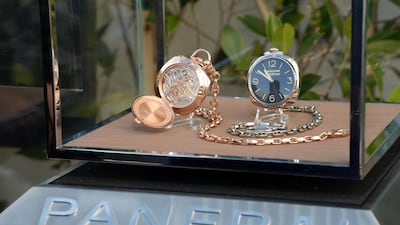Hong Kong’s decade-long position as the largest market for Swiss watch exports won’t last as other regions see accelerated growth, the chief of top brand Officine Panerai said.
The city, which is seeing tourism plummet amid months of protests, is poised to lose its leadership to the US and China, said Jean-Marc Pontroué, chief executive officer of Panerai, a unit of Swiss luxury firm Richemont.
“Even though Hong Kong has a very rich, dense local community plus millions of tourists, it’s not long-term foreseeable to keep that leadership,” Mr Pontroué said in an interview Friday in Hong Kong. “The potential in some markets has reached its top. Of course, China will continue to grow. The US will continue to grow.”
Hong Kong has sat on the throne of Swiss watch sales largely thanks to its status as a shopping haven. With no sales tax, an exotic lifestyle and countless luxury boutiques, the city has become a mecca for shoppers across the globe. Moreover, its proximity to mainland China gives it easy access to the country’s wealthy consumers eager to snap up luxury goods.
Watchmakers have been among the biggest hit by the violent protests and headwinds from the US-China trade war that have pushed Hong Kong into a recession. Sales of jewelry, watches and clocks dropped 41 per cent in September as tourism plummeted. Swiss watch exports to Hong Kong fell 4.6 per cent for the month, putting the market in second place behind the US.
The disruption has significantly impacted Panerai’s business in Asia’s financial hub, Mr Pontroué said, but the blow was offset by stronger demand in mainland China and neighboring countries.
“People are changing their habits to travel, and people are going to new destinations,” Mr Pontroué said. “We are compensating close to 100 per cent what we lose in Hong Kong by big business increases in mainland China, Korea, Japan, and Singapore.”
Panerai is joining other luxury goods makers in expanding its footprint in mainland China to tap the world’s biggest consumer pool. Deterred by geopolitics and a weak yuan, Chinese shoppers are increasingly shifting their luxury spending back home.
Three-quarters of luxury watches sold to Chinese customers will be bought within the country instead of by travelers in five years, compared with only a quarter just a couple of years ago, Mr Pontroué estimated.
Founded in Florence, Italy, in 1860, Panerai now has about 150 boutiques around the world, including more than 50 in China. The timepiece maker is planning to open an additional five stores in China before next March, extending its reach to lower-tier cities. Looking forward, there’s room to set up more boutiques in the country, especially at airports, the chief executive said.
Despite Hong Kong’s diminished status, Mr Pontroué is optimistic the city will recover soon after the clashes settle.
“Once it is over, business back to normal will be very quick, because appetite for Hong Kong will remain alive,” he said.

